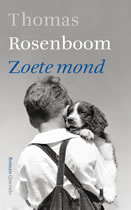Thomas Rosenboom
Sweet Mouth (Zoete mond)
Marvellous portrayal of human failings
Sweet Mouth, the title of this doorstopping fifth novel by Thomas Rosenboom, is borrowed from the author’s childhood when he was occasionally allowed to give himself a ‘sweet mouth’ by stuffing handfuls of sweets into his mouth all at once, producing an immediate sense of well-being.
The title is of course a metaphor for the world conjured up here by Rosenboom. He describes the lives of the villagers of the fictional Angelen on the banks of the Rhine, a place thrown out of kilter by an excess of feeling. When a beluga whale comes swimming up the river, the village is captivated by the animal and is swamped by a wave of emotion.
At the same time ‘sweet mouth’ describes the sensation felt by the reader as he absorbs Rosenboom’s novel. The author once again reveals himself a master at describing situations – as in the magnificent scene, several pages long, about a storm on the IJsselmeer – and, above all, states of mind. Rosenboom excels at apt, often merciless characterization.
He gives the reader a sweet mouth in another sense too, with his trademark use of sound, colour and rhythm. Take the opening sentence, full of repetition and internal rhymes, like a children’s song: ‘The men who caught him were fishermen, and huntsmen too, because he was a fish, and a mammal too – a beluga, small and pale, a white whale.’
Rosenboom plays on all our senses at once in his story of obsession and tragedy. Sweet Mouth, like all Rosenboom’s novels, excludes any possibility of a happy ending, as even the prologue suggests. The outcome, in essence, is contained in the short story that tells of the catching of the white whale called Moby, which precedes the main body of the novel. The final sentence of the prelude runs: ‘Yes, he had his freedom back. But he was alone.’
The loneliness in Sweet Mouth is that of two men, Rebert van Buyten and Jan de Loper. Rebert van Buyten is an outsider who settles in the village as a vet and soon has the villagers eating out of his hand, more by chance than by his own wisdom or skill. Rebert is a typical Rosenboom creation: unduly self-effacing, somewhat anxious, acting on misguided impressions of other people. Jan de Loper is in many ways his opposite. Born into wealth and the owner of a beautiful house on the edge of Angelen, he cannot resist brightening his empty life with practical jokes. He garners fame by travelling across Africa and by walking to Paris in slippers, then writing it all up in the local press, until the braggart becomes a hero in his own village.
The two men grow increasingly and fiercely competitive. Jan de Loper does not shrink from the most childish of tricks, even dressing up for St. Nicholas’ Day as the saint’s helper Black Pete and throwing sweets in Rebert’s face. Both are battling for the favours of the charming Louise Benda, although in truth they are trying to gain the attention of the whole world through her. The mild-mannered vet and the compulsive joker grimly struggle to break out of their isolation, to be alone no more.
Anyone who reads the prologue will know their efforts are in vain. Angelen is the stage on which Thomas Rosenboom’s marvellous portrayal of human failings is played out. Sweet Mouth inspires laughter but ultimately, more than anything, humility and compassion in the face of human loneliness.
Publisher
Querido
Singel 262
NL - 1016 AC Amsterdam
TEL. +31 20 551 12 62
FAX +31 20 639 19 68
E-mail: [email protected]
Website: www.querido.nl
Publishing details
Zoete mond (2009, 512 pp)

Biography
Thomas Rosenboom (b. 1956) made his debut in 1983 with a collection of short stories called De mensen thuis (Those at Home), for which he received the Van der Hoogt Prize. Two years later he published the novel Vriend van verdienste (Honourable Friend). In 1994 he astonished both critics and readers with Gewassen vlees (Washed Flesh), about the diabolical character William Augustijn van Donck. This was followed by Publieke werken (Public Works, 1999), which describes the tragic downfall of a nineteenth-century pharmacist and a violin maker. Both these novels were awarded the prestigious Libris Literature Prize. Rosenboom further published the novel De nieuwe man (The New Man, 2003) and the novella Spitzen (Point Shoes, 2004).
The magic of Rosenboom’s great novels rests on a number of classical literary devices perfectly implemented. The historical backgrounds in his novels are well documented and convincing without getting in the way of the story. He always has an ambitious main character and a riveting plot. In addition, his style is polished and trenchant, and he has a good eye for detail. In a subtle, often cruelly humorous way, his characters are led to inevitable ruin. All this makes his novels real page-turners.
Website: www.thomasrosenboom.nl
Dossier
Quotes
A typical Rosenboom novel: tragic and amusing, ominous yet hopeful.
NRC Handelsblad
The charm of the book: it tells its story through an apparent naïveté in a moving and simultaneously wonderous way about the motives and mechanisms that lie at the base of human relationships. […] Between the charming lines the story holds a sense of oppression.
De Standaard
